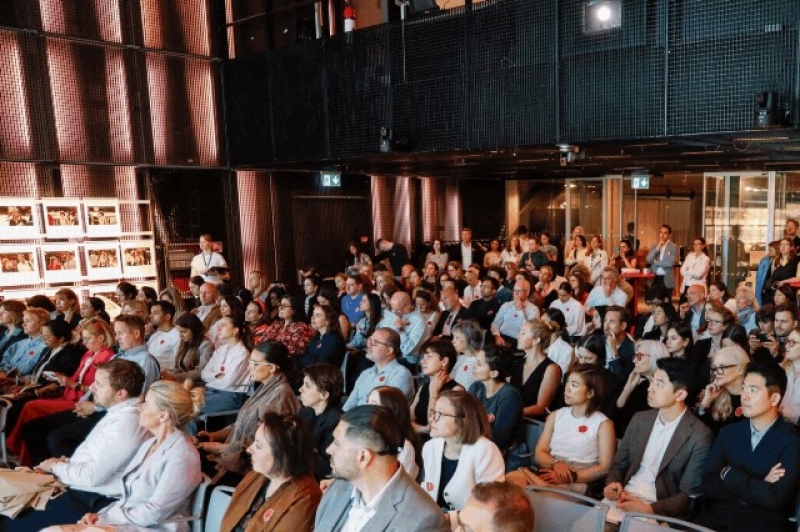- India Sees 9% Drop in Foreign Tourists as Bangladesh Visits Plunge |
- Dhaka Urges Restraint in Pakistan-Afghan War |
- Guterres Urges Action on Safe Migration Pact |
- OpenAI Raises $110B in Amazon-Led Funding |
- Puppet show enchants Children as Boi Mela comes alive on day 2 |
Policy Highlights from Global Fashion Summit: Copenhagen 2025

Global Fashion Summit, copenhagen 2025 audience.
Policy Masterclass: Political Barriers and Bridges in Deregulation Times
The Global Fashion Summit: Copenhagen Edition 2025 policy open-content kicked off with an engaging and insightful masterclass attended by over 220 participants. After a welcome address from Federica Marchionni, CEO of Global Fashion Agenda, Danish Member of Parliament Mette Reissmann stressed the critical role of competitiveness in the industry. Maria Luisa Martinez Diez, GFA’s VP of Public Affairs, provided context on the current geopolitical landscape and its impact on the fashion sector. Dr. Riyong Kim, Head of the Sustainability Department at the European Environment Agency, followed with an overview of EU textile-related policies and key data on textile consumption across the EU.
The masterclass featured a dynamic panel with Sarah Kent, Chief Sustainability Correspondent at The Business of Fashion; Claus Teilmann Petersen, Stakeholder Engagement and Human Rights Manager at Bestseller; Chelsea Murtha, Senior Director of Sustainability at the American Apparel & Footwear Association; and Lara Wolters, Member of the European Parliament. Key insights included:
• The industry is facing significant uncertainty due to the EU Omnibus Proposal. Although presented as a simplification, many perceive it as a step toward deregulation.
• In the U.S., discussions are increasingly dominated by rising tariffs, leading to a deprioritisation of sustainability on the policy agenda.
• There is a growing need for stronger corporate accountability, with calls for mandatory enforcement and penalties to replace voluntary initiatives to ensure meaningful compliance.
• While sustainability legislation is being introduced at the state level in the U.S., a lack of federal leadership is creating confusion, and brands are struggling to manage rising costs without state support.
Keynote Speech: The EU’s Circular Textile Journey: What’s Next?
Jessika Roswall, European Commissioner for Environment, Water Resilience, and a Competitive Circular Economy, delivered a keynote speech on the main stage of the DR Concert Hall, addressing the balance between competitive and committed sustainability in advancing the European Green Deal, and outlining the EU’s pathway to circularity. Key highlights from her speech included:
• Circularity remains a top priority, with a focus on keeping textiles within the EU market longer to reduce both costs and external dependencies.
• While the EU cannot regulate global practices, it can lead by example, through partnerships and impactful legislation such as the Ecodesign for Sustainable Products Regulation, Digital Product Passport, and Extended Producer Responsibility.
• A level playing field must be ensured between EU and non-EU actors, particularly as some imported online products fall short of regulatory standards. This will be addressed through rigorous enforcement of digital legislation, including the Digital Services Act, alongside strengthened market surveillance.
• Looking ahead, the Circular Economy Act, scheduled for 2026, will strengthen the business case for secondary raw materials in the textile sector while streamlining regulatory obligations.
“Sustainability is not a barrier to growth but a bridge to competitiveness, innovation, and inspiration.”

